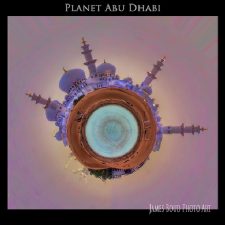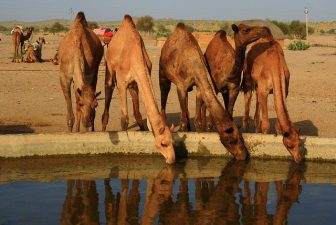I was out walking about a forest around Jerusalem today and kept hearing gunshots firing off from the Arab village across the way. They’re celebrating Hajj now, said my boyfriend. And I thought of all the Muslims who must be aching to make their pilgrammage to Mecca.
With so many people converging in one small place, one must wonder the environmental impact to the surroundings. Using Google as my Great Oracle, I punched in some keywords to see if there are some groups working to green Hajj.
Instead, I found the following essay on the importance of the environment for Islam, “Ecology in Islam: Protection of the Web of Life a Duty for Muslims,” By Dr. Hasan Zillur Rahim. I have included the following excerpts:
Writes Dr. Rahim in the Washington Report (2005), “Given that Islam provides an ecological outlook that is practical as well as ethical, how is it that, in terms of deforestation, air and water pollution, soil erosion, wildlife extinction and even toxic waste management, Muslim nations are no better than the industrialized nations of the world?”
He continues, “Among the varied and complex reasons for this, perhaps the most telling is that many of us are unaware of the environmental dictates of our religion. Few know that Qur’anic verses describing nature and natural phenomena outnumber verses dealing with commandments and sacraments.
“In fact, of more than 6,000 verses in the Holy Qur’an, some 750, one eighth of the Book, exhort believers to reflect on nature, to study the relationship between living organisms and their environment, to make the best use of reason and to maintain the balance and proportion God has built into His creation.
“For many Muslims, it will undoubtedly come as a revelation to know how emphatic the Qur’an is about protecting the environment. The Islamic approach to the environment is holistic. Everything in creation is linked to everything else; whatever affects one thing ultimately affects everything. Man has been distilled from the essence of nature and so is inextricably bound to it.
Of reforestation and land reclamation, for example, the prophet has said:
Whoever plants a tree and diligently looks after it until it matures and bears fruit is rewarded.”
If a Muslim plants a tree or sows a field and men and beasts and birds eat from it, all of it is charity on his part.”
Whoever brings dead land to life, that is, cultivates wasteland, for him is a reward therein.
He concludes, “In this Decade of the Environment, public concern over such phenomena as the greenhouse effect, ozone holes, acid rain, and the extinction of species builds upon that which followed publication in the 1960s of Rachel Carson’s Silent Spring, which made ecology a household word. An international effort is now underway to confront environmental ills that plague the earth. Sadly, the Muslim involvement remains reactive and minimal.”
For more:
::Washington Report





I have always been upset at the people that think Islam is a bunch of radicals that want to run the world. What is forgotten is there are individuals within the Islamic community that promote what is actually taught by the religion. I sort of knew there was an enviornmental component but have really seen nothing written about it. I only hope it is talked about and taught within the Mosques as with a large population of people that practice Islam they can make the world a better and cleaner place to live.
Thanks for stopping by. Syed Hossein Nasr is a Muslim philosopher situated in the US. In 1966 he gave a somewhat famous series of lectures at University of Chicago called “The Encounter of Man and Nature” where he stated that the degradation of environment reflects the spiritual crisis of our age. He blames the mechanistic world view that came out of the renaissance for this problem. For this reason he has been criticized by some Muslim writers also. However almost all references to modern Islamic discourse of the environment can be traced back to Nasr.
He was also a student of the famous orientalist Frithjof Schuon.
>> Sadly, the Muslim involvement remains reactive and minimal.”
This is indeed pretty sad given that Muslims like Syed Hossein Nasr were writing about environmental issues back in the early 60s.